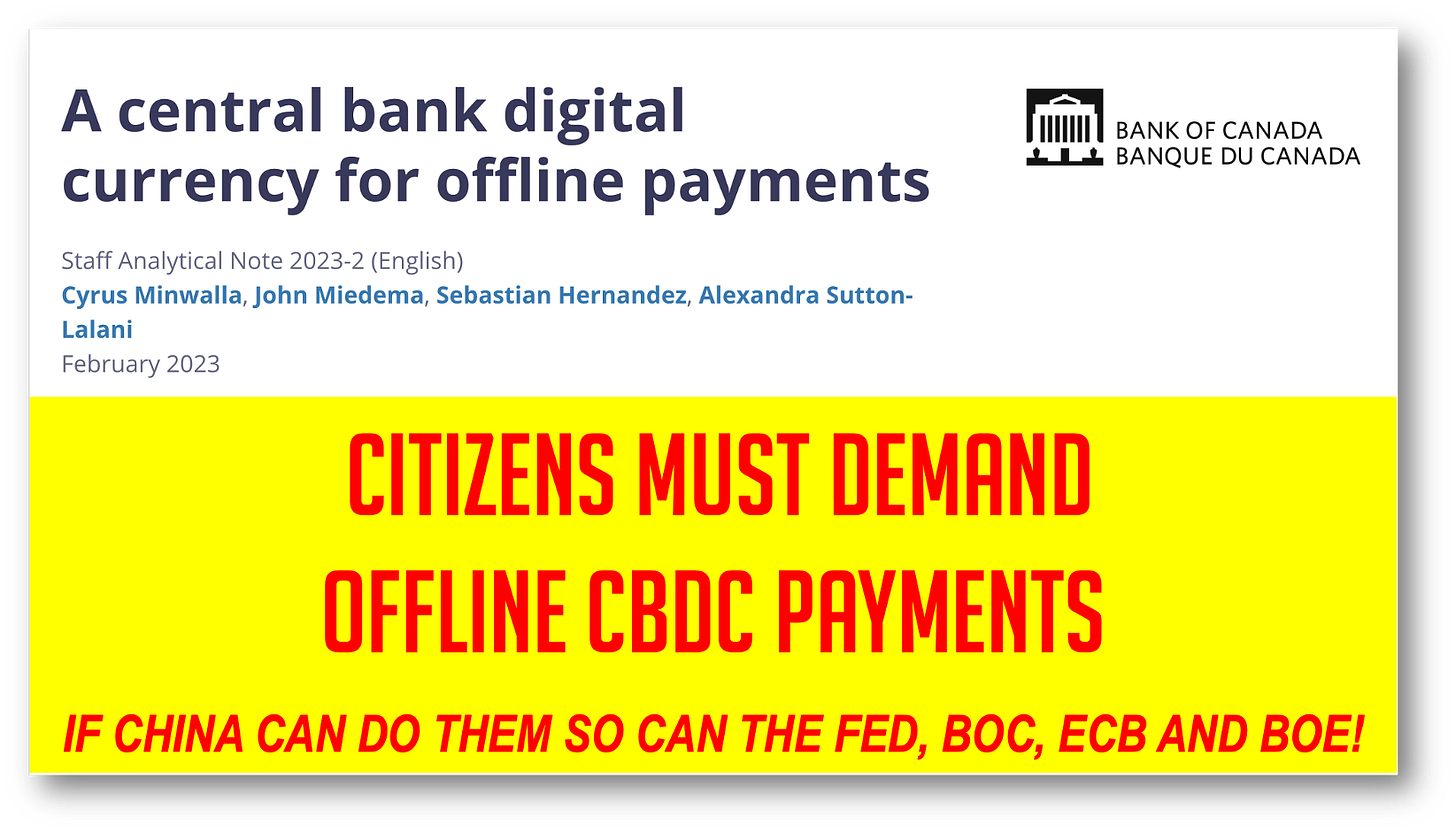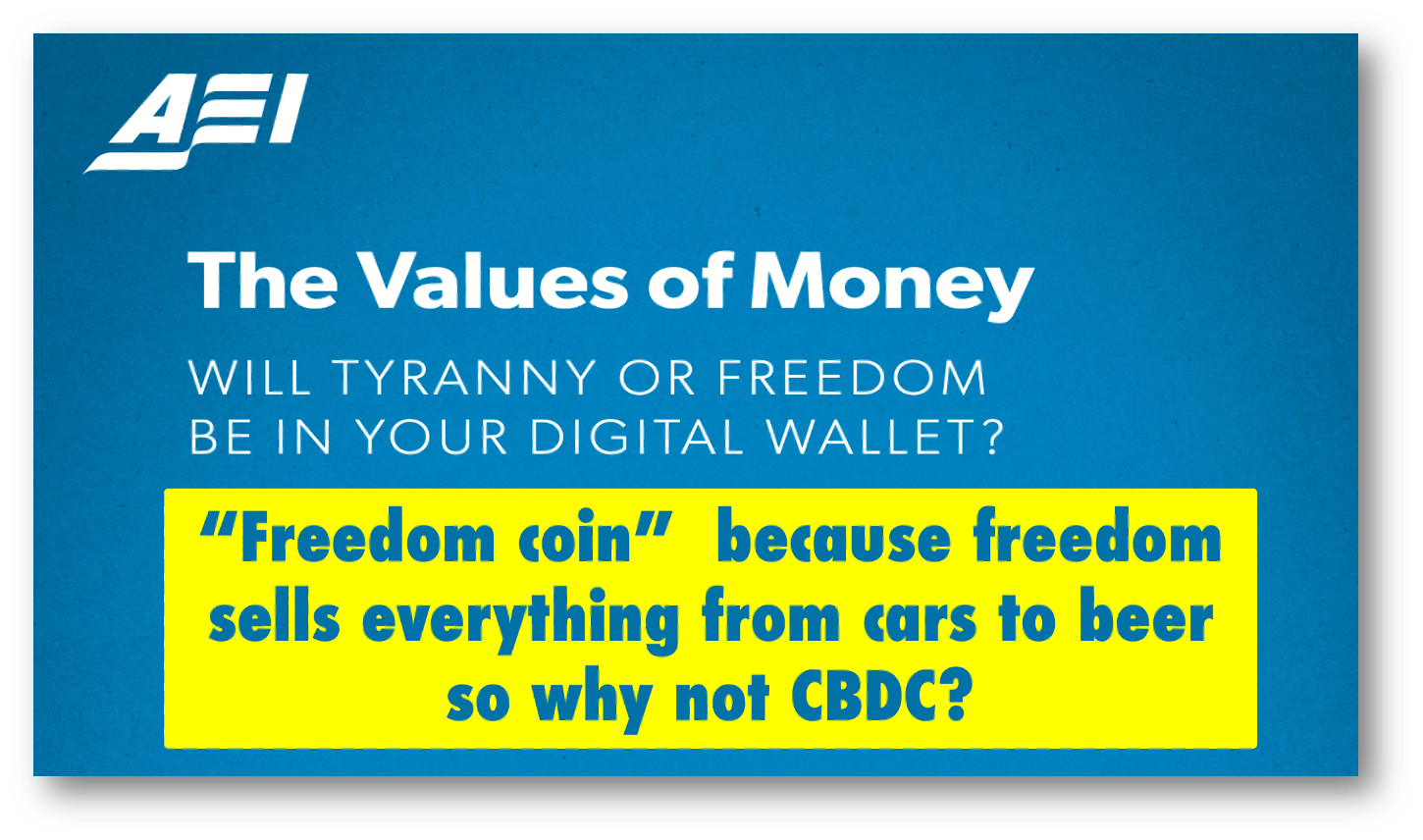DEMAND OFFLINE CBDC TRANSFERS; Digital yuan cross-border payments, The Asian 21st Century; Freedom sells the digital dollar.
Freedom sells cars and beer why not CBDC?
1. DEMAND OFFLINE CBDC TRANSFERS
2. Digital Yuan in cross-border payments
3. The Asian 21st Century (Free Book)
4. Using “freedom” to sell the digital dollar
Artwork: Yellow-Red-Blue, Wassily Kandinsky, 1925, Centre Pompidou
This basis of this painting lies in the balance between “contradictory and complementary elements.” To the left are geometric lines and luminous colors. To the right are sinuous forms and dark hues.
I loved the contradictory and complimentary elements which are the themes of all of today’s stories. Online vs offline use of CBDC, Asia and the West, freedom or tryranny in CBDC. All contradictory!
Please forgive any typos today am on holiday and racing to get outside in the lovely weather in Guangzhou.
I am proud to be the No. 4 global fintech influencer on the prestigious Onalytica influencer list. I got there by writing solid articles that people like you want to read. If you want crystal clear hype-free discussion on all CBDCs, fintech, crypto, and China’s tech scene, this is the place. All my writing is backed up by curating the best educational PDFs. Subscribe, and you’ll be glad you did!
1. DEMAND OFFLINE CBDC TRANSFERS
Citizens must DEMAND OFFLINE CBDC payments, do not accept the ECB and BoE not committing!
Note that in the first pages of this PDF I show picturs of China’s offline digital wallets. If China can figure out offline payments so can the West! Download: here
CBDC’s "make or break" feature is the ability to make offline payments. It is CRITICAL for financial inclusion, privacy, and system resilience.
Neither the European Central Bank (ECB) nor the Bank of England (BOE) has committed to offline payments with the digital euro and digital pound, only to research them, and that is a problem!
In this MUST READ report, the Bank of Canada makes it clear that “a range of approaches exist to address the risks present in offline solutions.” I consent that offline payments entail security and money laundering trade-offs, but technically they are not “rocket science.” The BOC does a great job!
The BOE and ECB should have followed the PBOC’s lead and made offline payments a MANDATORY initial design feature! I salute the BOE and ECB on their CBDC work, but on this feature, they dropped the ball!
To show that it is possible, I have included pictures of China’s offline devices. Not all these are in circulation yet, but they illustrate different security and display features. If China can do it, so can the ECB and BOE!
Why you should DEMAND OFFLINE transfers:
1️⃣ Increases resilience of the CBDC system:
It is sheer hubris to assume that connectivity and electricity are always present, even in developed economies. Natural disasters are the norm, not the exception. CBDCs with offline features can provide payments without either. Pretty basic, right?
2️⃣ UNIVERSAL ACCESS!
Inclusion! Do I need to say more? All nations have citizens who are elderly, disabled, or underprivileged who need a simple way to pay that requires the minimum of digital gadgetry.
Philosophically, you cannot claim that CBDC is a cash replacement and provides universal access without offline use. This is why I have consistently said that without offline use CBDCs replace credit cards, not cash.
3️⃣ Privacy preservation:
Offline payments are typically designed to be anonymous and safeguard privacy. They do have payment limits to protect against money laundering; however, within these limits, they allow citizens privacy near that of cash. Again this isn’t a wish list item; it is something citizens should demand.
Takeaways:
Offline payments are a “make or break” feature for CBDCs
Citizens should demand offline transfer for privacy, inclusion, and system resilience.
It is sheer madness to assume that signal or electricity never gets cut. Have central banks forgotten about natural disasters?
The tech is available, but it requires compromises in security and AML.
My answer is for gov’t to deal with the compromises, particularly on AML!
2. Digital Yuan in cross-border payments
The Digital Yuan and Cross-Border Payments!
My friends Oriol Caudevilla and Henry M. Kim in conjunction with the “Blockchain Research Institute,” wrote a GREAT paper on the digital yuan’s (e-CNY's) use in cross-border transfers. I was delighted to be a contributor.
Download: here
This is a fabulous read for everyone interested in e-CNY and clearly shows that the future is coming faster than most think.
The paper does a great job of highlighting the progress of the e-CNY up to August of 2022. Note that the report was released to the public just this past week.
While the PBoC has pressed forward with smart contracts and very high-value transfers since last summer, the paper is spot on in showing the e-CNY’s international potential and its ecosystem.
The author's conclusions are perfect:
“Any business operating in China or conducting operations with Chinese companies would be wise to prepare for using the digital yuan. That means looking to open e-CNY wallets for internal transactions, the only ones taking place right now, but cross-border transactions in e-CNY may become more common in a few years.”
What foreign companies in China should do now:
Let me add to the author’s recommendations. Any foreign company operating in Hong Kong, Macau or the Greater Bay Area with domestic Chinese accounts should immediately find out:
Which banks handle cross-border e-CNY transactions in your region;
How you can participate in trials;
If your bank doesn't have e-CNY trials, open an account in one that does!
Regional Comprehensive Economic Partnership (RCEP)
The authors also do a great job on the impact of the e-CNY on RCEP nations. RCEP is a game changer and “the first time China, Japan, and South Korea have been in a single free trade agreement, and it marks the first time China enters a nonbilateral free trade agreement of this scale [12 total nations].”
RCEP nations Japan, S. Korea, Indonesia, and Malaysia all have active CBDC development programs. An RCEP CBDC trading block is not just a pipe dream but a coming reality. The system for transfer, M-CBDC in Hong Kong, will be operational in 2024!
The authors lightly cover Russia and sanctions. Last year I proclaimed on CNBC that China would not use its e-CNY in trade with Russia. This year all bets are off.
Russia's CBDC enters trials in April, and by next autumn, anything can happen. Russia is using the yuan to keep its economy afloat, and e-CNY and e-Ruble trading will likely facilitate SME cross-border trade.
Takeaways:
Cross-border e-CNY transfers are coming!
While e-CNY hasn't been in the news much, the building continues.
An RCEP CBDC trading block is coming. It's not if but when.
E-CNY will also likely be used with Russian SMEs late this year.
3. The Asian 21st Century (Free Book)
Kishore Mahbubani’s just released “The Asian 21st Century”
Kishore Mahbubani is the founding father of the “Asia rising” school of thought and my hero!
Download: here
As a professor and celebrated Singaporean public servant with multiple stints at the UN he brings a gravitas to a topic that is certainly not celebrated in the West. (This book is open access, not stolen)
He is Singaporean and not an enemy of the US or western values, but believes that "the 21st Century will see the return of Asia to the centre of the world stage." His video interviews are often heated and he is quick to castigate those, imparting Western values or diktats to Asia.
Asia Rising
China and Asia rising is a central theme around my Linkedin writing and, of course, in my book “Cashless.” When I came to China in 2010 from a US/EU-centric life, it hit me within about two or three years that the West was undervaluing the accomplishments and potential of China and Asia.
Products and achievements that should have been met with wonder, praise, or compliments were met with snide, derision, or flat-out belittlement. The best example from fintech was Alipay and QR codes which were at first treated as nothing more than a fad and deemed unsuitable for payments in the West. I laugh when I see that both the ECB and BOE CBDCs will use QR codes!
The West knows about Asia and China's accomplishments but, in its arrogance, behaves like a big brother dismissing or demeaning a younger brother’s achievements. I still see this daily across many disciplines, not just fintech, and CBDCs!
The West’s Errors
Mahbubani's higher-level answer to this problem is that the West is making strategic errors:
"Many of the problems faced by the West can therefore be explained by these two major strategic mistakes made by the West.
-The first is the failure to see that in the twenty-first century, we have reached the end of Western domination of World History.
-The second is the failure to see that the world is now seeing the return of Asia, especially the most successful societies in East Asia, Southeast Asia, and South Asia."
Readers won't be surprised that I believe Mahbubani is on target.
For some, the book will confirm your belief in the coming Asian century, while for others, it may just raise the possibility that an Asian century is possible!
Takeaways:
Asia is rising. Disbelieve this at your peril.
The ability of the US and EU to dictate terms to Asia is over.
These changes are part of a “big cycle” of change. (See Ray Dalio's great free articles on Linkedin.)
The West ignoring this change will make us all poorer.
4. Using “freedom” to sell the digital dollar
FREEDOM SELLS as the digital dollar is now the “Freedom coin” because everything sells better with freedom!
Download: here
The American Enterprise Institute (AEI) has come off the rails by branding a privacy-protecting digital dollar, the "Freedom Coin" using a trick from US advertising. Wrap anything in freedom, and it sells better, from beer to cars, so why not CBDC?
This isn’t new and follows a disturbing trend that I noted in the Biden administration’s digital dollar research reports that push for a US CBDC that supports “US values.” The irony is that these calls for freedom are coming at a time of massive sanctions, which push de-dollarization. So the big question this raises is: freedom for whom?
Worse, the AEI cruelly denigrates the efforts of the EU's digital euro or the UK's digital pound in privacy protection as though the AEI cornered the market on CBDC privacy. Shame on the AEI! The AEI would do well to remember that the EU leads the US in digital privacy protection through GDPR and AI regulations that have no parallel in the US!
The digital yuan and “freedom coin” share technology!
The authors' gross mischaracterization of the digital yuan and life in China is stunning. They present the digital yuan as the “bad guy” and present such a stark false dichotomy fair-minded readers have to ask what the authors are hiding.
If the authors contend that China is so hell-bent on money control, why isn’t this already evident with broad bans and blocks on Alipay and WeChat Pay use? The authors' portrayal of the digital yuan as something resembling a "Captivity Coin®™" is stunning and doesn’t reflect the reality in China today.
The unfortunate reality is that unless the Freedom coin can tackle FISA mass surveillance, warrantless FBI surveillance of money transfers, the bank secrecy act, and third-party doctrine, all of which obliterate privacy from American's financial lives, it will have a long way to go toward providing freedom! This seems unlikely.
In the peak of irony, the authors' grand solution to these problems is that the Freedom Coin use “intelligent enforcement” or big data as a "new" system for KYC and AML. THIS IS THE EXACT SAME solution China is deploying with e-CNY!
Now we know what they were hiding; they merely copied China! I’m sorry if that’s harsh, but to rail against China and then adopt the same big data-based solution as China seems disingenuous, even if the solution is a good one.
Critically, the authors are missing the biggest problem the dollar faces on the global stage today. The more the US ties dollar usage to “American values,” the more it pushes nations away from using them.
Dedollarization’s root cause
The root of de-dollarization is the fear that the greatest risk to the dollar is that you won’t be able to use it. The Freedom coin branding furthers foreign users' fear of this risk.
This was not always the case. In the post-WW2 era, when the dollar was adopted as the global reserve currency, “Buy American” meant using dollars, and few questions were asked. Even the USSR could use them!
I couldn’t agree more that the US CBDC should promote privacy, but let’s return to the post-WW2 dollar, an open medium of exchange with a less bombastic approach to values.
The AEI is worse than an advertiser using freedom to sell beer that tastes bad.
Takeaways:
This paper is beneath the AEI’s standing and that of the primary author Christopher Giancarlo. If they want to be a premier lobbying group supporting a digital dollar, they need to do better than this.
The AEI would do better to show how a digital dollar would benefit every American family by removing the hidden tax of credit cards and banks.
The digital dollar is not a car or beer, and the AEI would do well to remember that.
If you’ve read this far, subscribing is the only logical course of action.
And share on Twitter because:
"The needs of the many outweigh the needs of the few or the one."
My work is entirely supported by reader gratitude, so if you enjoyed this newsletter, please do both of us a favor and subscribe or share it with someone. You can also follow me on Twitter, or Linkedin for more. The best way to ensure you see the stuff I publish is to subscribe to the mailing list here on Substack, which will get you an email notification for everything I post.
Everyone, including platforms that disagree with me, has my permission to republish, use or translate any part of this work or anything else I’ve written (except my books) with credit given to me and this site (richturrin.substack.com) free of charge. For more info on who I am, what I do, and where I’m going, check out richturrin.com
Rich Turrin is the international best-selling author of "Cashless - China's Digital Currency Revolution" and "Innovation Lab Excellence." He is number 4 on Onalytica's prestigious Top 50 Fintech Influencer list and an award-winning executive previously heading fintech teams at IBM following a twenty-year career in investment banking. Living in Shanghai for the last decade, Rich experienced China going cashless first-hand. Rich is an independent consultant whose views on China's astounding fintech developments are widely sought by international media and private clients.
Please check out my books on Amazon:
Cashless: HERE
Innovation Lab Excellence: HERE












